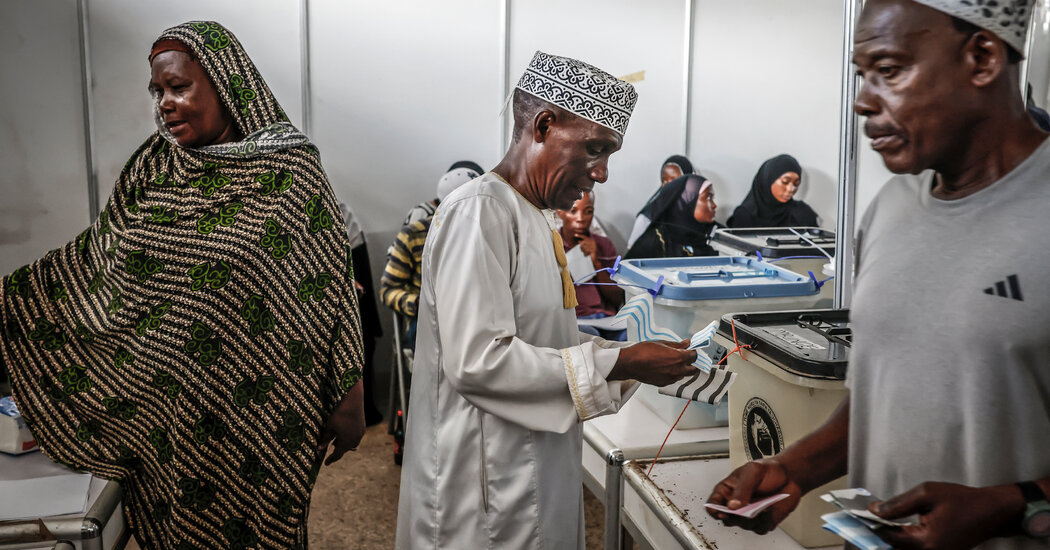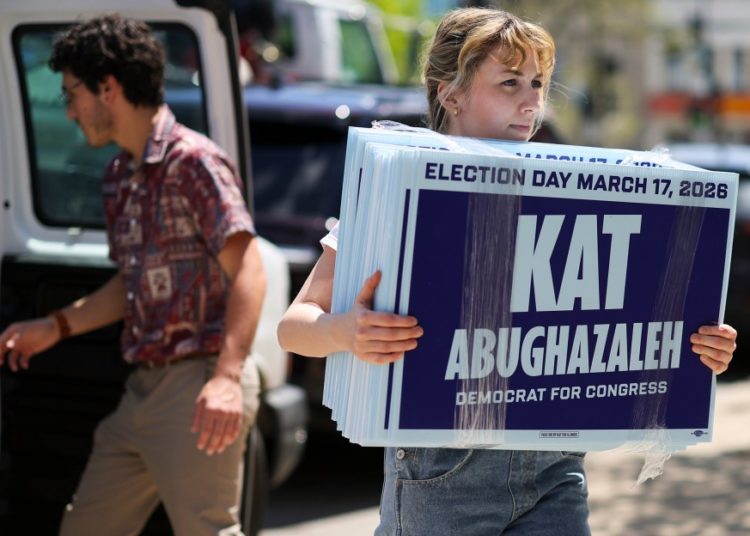President Samia Suluhu Hassan of Tanzania is facing voters on Wednesday for an election in which the main opposition leader was kept off the ballot and is standing trial for treason, and a second opponent has been disqualified by the electoral commission.
It is the third election in Africa this month, after Cameroon and Ivory Coast, in which the top potential challenger has been barred from running, effectively clearing a path for an incumbent victory.
Police used tear-gas against demonstrators in Dar es Salaam, the main city, on Wednesday and the internet watchdog NetBlocks reported serious internet disruptions.
Ms. Samia was elevated to the presidency in 2021 from the post of vice president when her predecessor, John Magufuli, died unexpectedly during the coronavirus pandemic. The election this week has given her an opportunity to cement her authority as the country’s leader.
Human rights groups and critics in Tanzania accuse the government of corrupting the electoral process by stifling the opposition with a series of abductions, detentions and forced disappearances of activists and journalists.
A United Nations report in June described the moves as electoral “repression,” accusations that the government has denied.
The calls for demonstrations on Wednesday echo the protests seen in Kenya, Mozambique and Morocco, led by Gen Z voters.
“The most important thing in this election is the question of legitimacy,” said Richard Mbunda, a lecturer in political science at the University of Dar es Salaam. “There is legal legitimacy provided by the Constitution and there is legislation to guide the conduct of the elections. But there are questions regarding political legitimacy.”
The East African country’s democracy is in some ways an outlier in the region. Tanzania joined a wave of African states that embraced multiparty democracy in the 1990s. In some places, voters wielded their power to sweep away ruling parties and longtime leaders, heralding the prospect of renewal.
But in Tanzania, the result has been to further entrench the ruling party, Chama Cha Mapinduzi, or Party of the Revolution, known as CCM, which has won six consecutive multiparty elections, spanning four leaders. (It also rules the semiautonomous archipelago of Zanzibar, which holds a general election on Wednesday.)
The Party of the Revolution was founded in 1977 and traces its roots back to independence under Julius Nyerere in 1961. It has become one of the longest-ruling parties on the continent.
Who is Tanzania’s president?
Ms. Samia, 65, is one of the few women to have reached the pinnacle of political power in Africa.
She hails from Zanzibar and is the daughter of a stay-at-home mother and schoolteacher father. She earned bachelor’s and postgraduate degrees in economics and public administration at schools in Tanzania and Britain, and later worked with the World Food Program and for nongovernmental organizations in Zanzibar.
She is also a party stalwart who held ministerial positions in Zanzibar before becoming vice president.
Since taking office, she has made the so-called four R’s — reconciliation, resilience, reforms and rebuilding — her signature policy. She has campaigned under the slogan Work and Dignity, or Kazi na Heshima in Kiswahili, the national language.
What about the opposition?
The country’s main opposition leader, Tundu Lissu of the Chadema party, left the country after he was defeated in elections in 2020, but returned three years later, saying he was hopeful that Ms. Samia would allow an expansion of political freedoms.
But Mr. Lissu, who had survived an assassination attempt in 2017, was briefly arrested last year ahead of a political demonstration.
In April, he was arrested again after calling for political reforms at an election rally. He was charged with treason and the same month the electoral commission disqualified his party from fielding a presidential candidate.
Mr. Lissu, who has called the charges politically motivated, pleaded not guilty when his trial began this month. It is not set to conclude until after the election.
The electoral commission has also barred Luhaga Mpina of ACT-Wazalendo, the second-largest opposition party, from standing. With the leading challengers barred from the race, a host of smaller parties have fielded candidates.
Mr. Mbunda said that turnout, which stood around 50 percent in 2020, may be a metric of enthusiasm for the opposition.
The president has “overseen an unprecedented crackdown on political opponents,” the International Crisis Group said in a report in October. “With most opponents muzzled, Samia and the CCM appear set to secure a landslide victory in a largely ceremonial process.”
What about the economy?
Tanzania is rated as a lower middle income country. Agriculture is a big driver of employment as well as growth, and the country is one of Africa’s most significant gold producers, while tourism in the savanna and in Zanzibar is another source of foreign exchange.
But Tanzania, like other African countries, has struggled to provide employment for young people entering the work force and this, along with surging food inflation and high fuel costs, are a source of voter discontent. There is little evidence, however, that voter frustration or protests will derail the ruling party’s ambition for the election, for which results are expected in the coming days.
Matthew Mpoke Bigg is a London-based reporter on the Live team at The Times, which covers breaking and developing news.
The post Protests as Tanzania Votes, With Opposition Leaders Barred From Running appeared first on New York Times.




